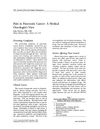 January 2005 in “Pediatric Dermatology”
January 2005 in “Pediatric Dermatology” Alopecia areata in infants may be more common than previously thought.
 January 2003 in “American Journal of Clinical Dermatology”
January 2003 in “American Journal of Clinical Dermatology” Various drugs caused different skin reactions, including allergic and inflammatory responses.
 July 1999 in “Journal of The European Academy of Dermatology and Venereology”
July 1999 in “Journal of The European Academy of Dermatology and Venereology” Bath PUVA therapy works well for a skin condition without as many cancer risks and is cheaper, and iron deficiency might not cause female hair loss.
 May 1993 in “Current problems in dermatology”
May 1993 in “Current problems in dermatology” Skin symptoms are important for diagnosing infections in children.
 January 1988 in “Journal of Pain and Symptom Management”
January 1988 in “Journal of Pain and Symptom Management” Pancreatic cancer pain management is inadequate due to the disease's severity and limited effectiveness of treatments.
 January 1982 in “Journal of The American Academy of Dermatology”
January 1982 in “Journal of The American Academy of Dermatology” Experts discussed treatments for skin conditions in children, emphasizing hydration, cautious medication use, and early intervention for infections.
 January 1978 in “Clin-Alert”
January 1978 in “Clin-Alert” A document listed serious side effects from various drugs, including deaths and diseases, emphasizing the importance of being aware of drug side effects.

A drug helped quickly reduce a movement disorder, experts debated the severity of Raynaud phenomenon, and rapid weight loss was linked to temporary hair loss with good recovery.

Enemas can cause septicemia in elderly men with prostate infections.

Most people with Raynaud's won't get serious diseases, but doctors should watch for signs over time; also, quick weight loss can cause hair loss.

Rapid weight loss can cause temporary hair loss, but hair usually grows back.

Doctors disagree on whether Raynaud phenomenon often leads to serious diseases, but agree that patients should be monitored for possible progression while being reassured. Rapid weight loss may cause hair loss.
 July 1975 in “Archives of Dermatology”
July 1975 in “Archives of Dermatology” The document suggests a possible connection between rapid weight loss and hair loss, and reports a case of skin condition improvement after stopping acne medication.
 November 1966 in “British Journal of Dermatology”
November 1966 in “British Journal of Dermatology” The meeting discussed various skin conditions, treatments, and unusual cases, highlighting the effectiveness of tetracycline in treating rosacea.
 January 2012 in “The Year book of dermatology”
January 2012 in “The Year book of dermatology” Finasteride 5mg/day improves hair loss in normoandrogenic Asian women.
26 citations,
April 2006 in “Cephalalgia” Botulinum A toxin injections reduced pain and promoted hair regrowth in a woman with a rare form of alopecia areata.

COVID-19 infection is highly related to increased hair loss, especially in women.
 November 2022 in “Journal of Investigative Dermatology”
November 2022 in “Journal of Investigative Dermatology” COVID-19 patients with hair loss experienced greater cognitive deficits and more symptoms of depression, anxiety, and stress.

COVID-19 patients with hair loss experienced more cognitive issues and these issues were linked to higher levels of depression, anxiety, and stress.
10 citations,
September 2015 in “BMC pharmacology & toxicology” Gloriosa superba poisoning can mimic severe tropical infections and cause rapid hair loss.
 8 citations,
October 2021 in “Indian Journal of Plastic Surgery”
8 citations,
October 2021 in “Indian Journal of Plastic Surgery” COVID-19 may cause increased and quicker hair loss compared to other infections.
 7 citations,
September 2021 in “Anais Brasileiros De Dermatologia”
7 citations,
September 2021 in “Anais Brasileiros De Dermatologia” COVID-19 can cause temporary hair loss, often starting around 7-8 weeks after recovery, with factors like Vitamin D deficiency, other diseases, medication, and stress potentially contributing.
 4 citations,
October 2022 in “Journal of family medicine and primary care”
4 citations,
October 2022 in “Journal of family medicine and primary care” Some people in Saudi Arabia experienced hair loss after the COVID-19 vaccine, more often in women and those without prior hair loss.
 4 citations,
February 2022 in “Journal of Cosmetic Dermatology”
4 citations,
February 2022 in “Journal of Cosmetic Dermatology” Monocytes might be linked to hair loss after COVID-19.
 3 citations,
April 2021 in “Revista da Sociedade Portuguesa de Dermatologia e Venereologia”
3 citations,
April 2021 in “Revista da Sociedade Portuguesa de Dermatologia e Venereologia” Some people who got COVID-19 experienced temporary hair loss starting around 10 weeks after infection, with many seeing improvement within about 25 days.
 2 citations,
August 2022 in “Clinical Case Reports”
2 citations,
August 2022 in “Clinical Case Reports” A 17-year-old girl had severe, on-and-off hair loss, likely due to COVID-19. She was treated with Vitamin D3, biotin, and other supplements, and saw some improvement within a month.
 1 citations,
April 2022 in “Revista Da Associacao Medica Brasileira”
1 citations,
April 2022 in “Revista Da Associacao Medica Brasileira” COVID-19 can cause different types of hair loss, and proper diagnosis by a specialist may be needed.
 October 2024 in “Annals of Allergy Asthma & Immunology”
October 2024 in “Annals of Allergy Asthma & Immunology” Anaphylaxis from cow's milk allergy can cause temporary hair loss in children.
 October 2023 in “Journal of Preventive Diagnostic and Treatment Strategies in Medicine”
October 2023 in “Journal of Preventive Diagnostic and Treatment Strategies in Medicine” Low ferritin and Vitamin D levels may cause hair loss after COVID-19.
 January 1998 in “Jaypee Brothers Medical Publishers (P) Ltd. eBooks”
January 1998 in “Jaypee Brothers Medical Publishers (P) Ltd. eBooks” Telogen effluvium is a condition that causes temporary hair loss due to stress or shock to the body.




























